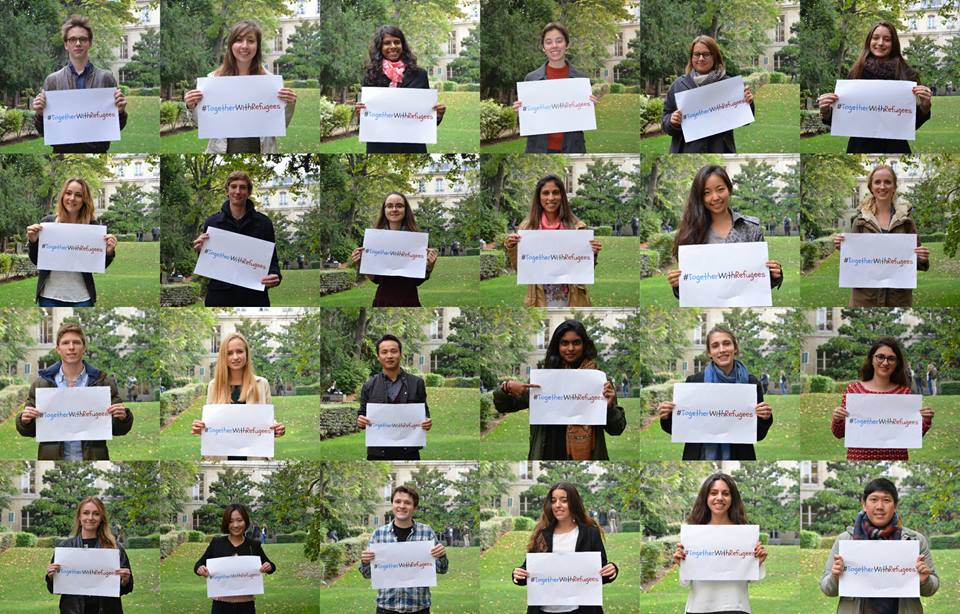By Elizabeth Walsh
When we started at Sciences Po this Autumn, it was impossible to ignore the refugee crisis exploding over the media alongside our first days navigating new classes. Sara Bonyadi, a Master’s student in International Development, saw the tents at Gare d’Austerlitz in early September and felt compelled to get involved. Unfortunately, the overwhelmed organizations working on the ground were too inundated to respond to her requests to help. So she posted on the Paris School of International Affairs (PSIA) Facebook page, seeking Arabic speakers who could help her talk to refugees and assess the situation directly. Ten minutes later, she had over 30 responses. By the end of the day, she had a Facebook group with more than 300 members. Two days later, a group of students went to the camp to conduct a needs assessment.
The dominant story in the media has been one of Syrian refugees, particularly children. But the refugees here in Paris have a wide range of stories. Many of the people who arrived in Paris at Gare d’Austerlitz come from places as diverse as Sudan, Eritrea, Mali, Guinea, and Afghanistan, and are educated adults who had skilled careers before they were forced to leave. Sudanese refugees tend to be “double asylum” seekers — they fled from Sudan to Libya in the early 2000s due to the genocide in Darfur and, like others in Libya, have since been expelled following the post-Qaddafi political crisis. Amnesty International, in an article published last May (“Libya: Horrific Abuse Driving Migrants to Risk Lives in Mediterranean Crossing,”) refers to asylum seekers and refugees in Libya as among the most vulnerable in the country. One of the challenges facing those who seek to raise awareness on the plight of refugees is that their story fails to meet the mainstream narrative. People expect refugees to be tattered and destitute, a set of assumptions with a genuine stamp of White Savior syndrome that makes some reluctant to provide support. Those who focus on the education and signs of material wealth of certain refugees fail to see that this is a crisis of thousands of people who have lost their communities, careers, and countries. What they need is a bridge to self-empowerment so that they can reclaim their lives anew. Sciences Po Refugee Help (SPRH) aims to help close this very gap and ease some of the administrative and language barriers that asylum seekers face, as well as provide a sense of community in order to alleviate the burden of trauma.
The Facebook group that Sara started a few months ago now has nearly 1,000 members and 200 regular, committed volunteers. SPRH is officially recognized by Sciences Po, who has been supportive throughout the process. In a recent video, Sciences Po President Frédéric Mion urged us to play our part in helping refugees here in Paris. Professors have also provided their expertise, the Law Clinic has ensured that the group has up-to-date legal training and information, and the administration has been proactive in linking the group to additional resources and fundraising.
Currently, SPRH is made up of seven sub-groups that tackle functions including French lessons (they are always looking for Arabic, Farsi, and Pashto speakers!), material needs, family support, asylum aid, social activities, a welcome team, and group administration. The groups work with associations such as the Red Cross, Aurore and the Salvation Army. In addition to teaching French, they organise social activities (an important yet often overlooked need — not only do people need a sense of community and belonging, but “ability to integrate” is part of the asylum process in France) and complement the work of other organizations. For example, the asylum aid group briefs refugees on the process so that by the time they connect with a social worker, they can ask more informed questions and get through the process more efficiently. The welcome team eases the transition to Paris by providing newcomers with metro maps, emergency contacts, useful translations from Arabic, Farsi and Pashto to French, and personalized letters from Sciences Po students.
The Sciences Po Refugee Help group exemplifies our tradition of solidarity at Sciences Po. Following the 13 November attacks, Vice Dean Vanessa Scherrer wrote to PSIA students: Sciences Po “is a strong community, of thought and of solidarity, and this has particular meaning in the tragic times we are facing.” SPRH’s work builds bridges across languages and cultures and brings people together to improve their livelihood and opportunities to start anew here in Paris. It is a story of resilience that, in the wake of current events, strikes us even more so as a universal one; in times of hardship, helping others can forge bonds that replace ignorance with understanding, and fear with hope.
| Want to get involved? For long term commitments of two hours per week (or more) sign-up via facebook.com/sciencesporefugeehelp or reach out to refugeehelp@sciencespo.fr; for one-time volunteer opportunities, join the SPRH Group on Facebook for real-time tasks that match your expertise. SPRH welcomes volunteers from everywhere — not just Sciences Po! If you don’t live in Paris, don’t have the time, or wish to make a monetary contribution as well, SPRH collects funds via GoFundMe (gofundme.com/westandtogether), and posts regular updates on their activities via their official Facebook page. Because SPRH is working on the ground, they’re able to adjust to the evolving needs of the refugees. The use of donations is very transparent, as they provide detailed budgets and regular updates to donors who want to know how their money is being used. |
Credit for featured image: Sciences Po Refugee Help

